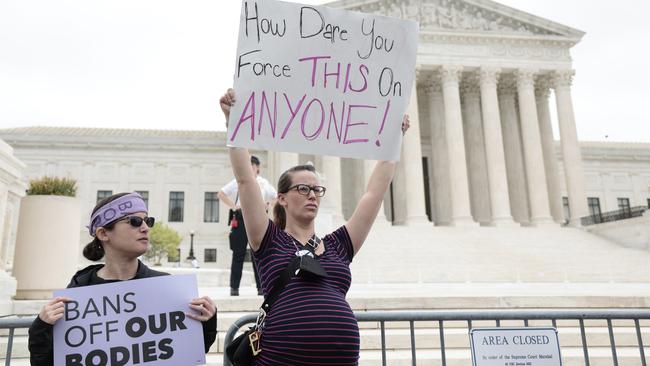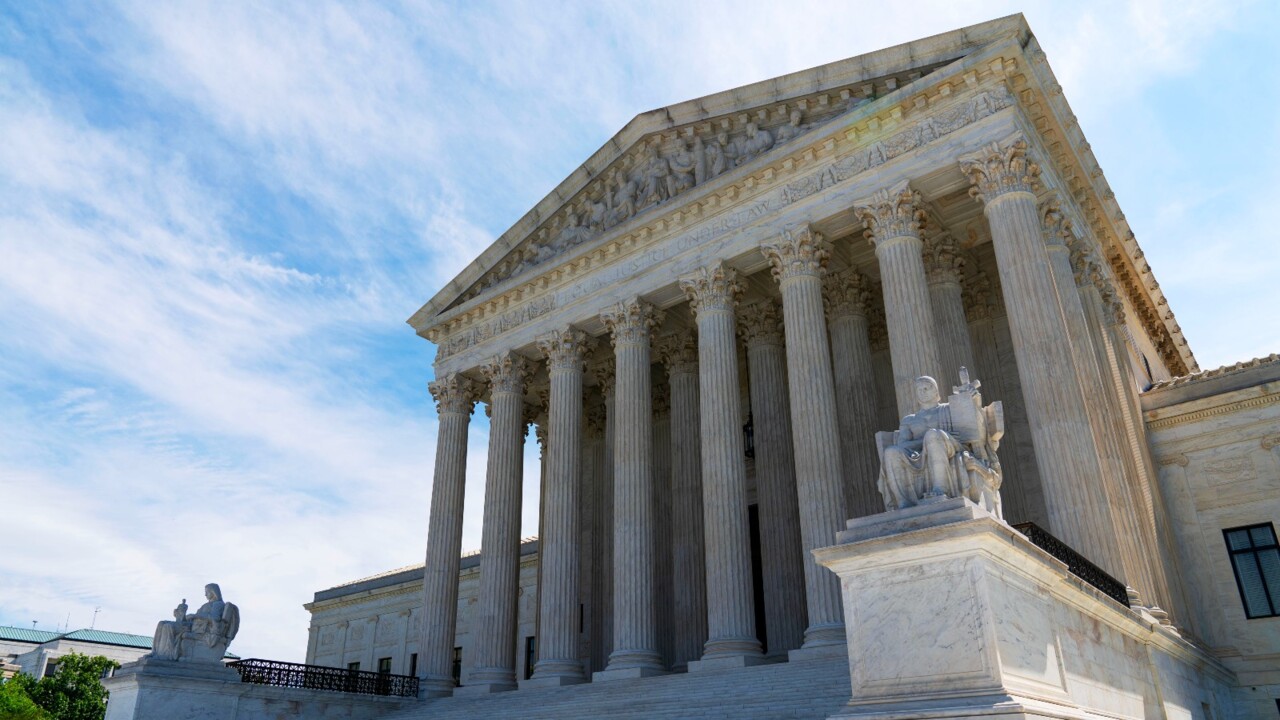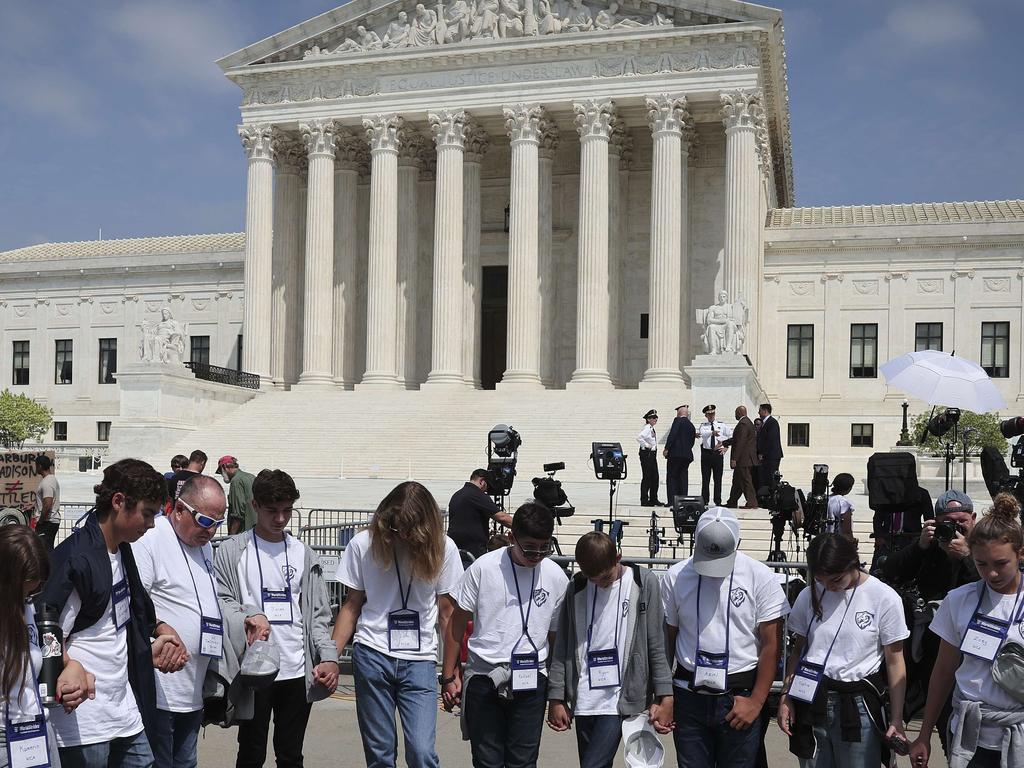Abortion rights: End of Roe v Wade to return authority to the people
The idea Americans should have the power to decide the legal limits on abortion at the state level, via their elected representatives, infuriates authoritarian elitists.

She may be correct about the unpopularity of overturning the landmark 1973 Supreme Court decision in Roe v Wade that created the right to have an abortion, striking out any laws to the contrary. That remains to be seen.
But the idea the court plans to impose its ideas on the entire country is nonsense. The opposite is nearer the truth.
As the leaked initial draft majority opinion delivered by Justice Samuel Alito makes clear, the Supreme Court has been imposing its personal policy preferences on the entire country for almost 50 years, having created a constitutional right to abortion that plainly doesn’t exist.
“The court usurped a power to address a profound social and moral question that the constitution unequivocally leaves for the people … an error that cannot be allowed to stand,” the draft opinion reads.

Far from imposing its views, the Alito draft opinion, assuming enough of the remaining eight judges ultimately agree with him, would excise the court from the equation entirely, leaving the laws about abortion up to individual states and their legislatures.
That’s how every other nation, including Australia, deals with abortion: legislation, which varies across Australia’s states and territories.
Mississippi’s law banning abortions beyond 15 weeks, the issue that has prompted the court’s latest review, would be considered progressive in much of Europe, where abortions typically aren’t available beyond three months without a good reason. Indeed, only a handful of nations permit “on demand” abortion beyond 20 weeks, including China, North Korea, Canada, Singapore, Vietnam and The Netherlands.
Reversing previous judgments happens a lot. Even the brightest among us make errors, and the Roe decision was a collective brain snap that even defenders of abortion rights, including Ruth Bader Ginsburg, one the most progressive Supreme Court justices, have found to be flawed.
“Without any grounding in the constitutional text, history, or precedent, (Roe) imposed on the entire country a detailed set of rules much like those that one might expect to find in a statute or regulation,” the Alito draft opinion says.
Roe v Wade was the ultimate in activist judicial decision-making. The judgment spent more time talking about infanticide in antiquity than the state of the law and custom across the US.
Roe was so “egregiously wrong from the start”, as Alito puts it, even on questions of basic fact, that the second time the Supreme Court looked at it, in Planned Parenthood of Southeastern Pennsylvania v Casey in 1992, the justices could find only one serious argument for keeping it: precedent. In other words, this might be a really bad judgment but people have become used to it.
The Supreme Court has overturned other terrible decisions, most famously the embarrassing 1896 Plessy v Ferguson decision that condoned racist “separate but equal” school policies, which clearly flouted the 14th amendment of 1868 and which was overturned in Brown v Board of Education of Topeka in 1954.
Warren’s naive characterisation of the court’s intention was deliberate. Alito’s arguments may be the “right” ones intellectually, but they are a political godsend for Democrats, who may yet end up doing much better in the November elections in the wake of this draft opinion than they otherwise would have.
In an era where rights are a lot more popular than responsibilities, the perception women are losing their right to abortion, even if it means little in practice, will undermine support for Republicans and energise left-wing activists. Democrat political strategists privately will be cheering the draft opinion and winking approvingly at Warren’s absurd characterisation of it.
The leaker in the Supreme Court will become a hero for kickstarting the Democrats’ campaign months ahead of schedule. If the Democrats manage to keep hold of the Senate in November, this will be the reason.
Let’s be clear; the viciousness of the debate over Alito’s learned prose doesn’t reflect the real impact the court’s ultimate judgment will have. Women with access to resources still will have abortions in the US, in extreme cases having to travel to a different state. Almost 93 per cent of the 630,000-odd abortions in 2019 occurred before 13 weeks, according to the Centres for Disease Control and Prevention, well within the laws even in supposedly hardline Mississippi.
And women without means will continue to have children they perhaps shouldn’t have had, owing to incentives in the welfare system and a host of complex other reasons.
What enrages the supposedly pro-choice activists is the world view the justices appear poised to embrace: democracy and states’ rights, as described in the US constitution, over authoritarian elitism. The idea ordinary people should have the power to decide the legal limits on abortion rights at the state level, via their elected representatives, infuriates authoritarian elitists who dominate the upper echelons of US society.

Yes, the Supreme Court may have erred in 1973, making up a right that didn’t exist, but if the error suited the mores and preferences of the ruling elite, who cares?
The past two years have highlighted how champions of bodily autonomy, privacy and human rights the world over were only too happy to mandate vaccines, lock people up for months and track their movements.
People of good conscience can have different views on abortion; philosophers and doctors alike have long struggled to agree on when a foetus becomes a child. There’s no obvious answer.
But people who believe words should have meaning and that major issues of law should be resolved democratically should have no trouble with Roe v Wade being overturned.







The strangest take on the leaked initial draft majority opinion from the US Supreme Court, which paves the way for overturning the right to an abortion in the US, was that of Democrat senator Elizabeth Warren, who castigated the court as an extremist body poised to “impose its far-right, unpopular views on the entire country”.